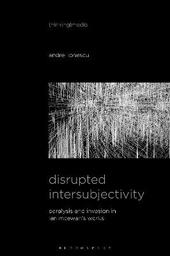
|
Disrupted Intersubjectivity: Paralysis and Invasion in Ian McEwan's Works
Paperback / softback
Main Details
| Title |
Disrupted Intersubjectivity: Paralysis and Invasion in Ian McEwan's Works
|
| Authors and Contributors |
By (author) Dr. Andrei Ionescu
|
| Series | Thinking Media |
|---|
| Physical Properties |
| Format:Paperback / softback | | Pages:224 | | Dimensions(mm): Height 216,Width 140 |
|
| Category/Genre | Literary studies - from c 1900 -
Literary studies - fiction, novelists and prose writers |
|---|
| ISBN/Barcode |
9781501391149
|
| Classifications | Dewey:823.92 |
|---|
| Audience | | Tertiary Education (US: College) | | Postgraduate, Research & Scholarly | |
|---|
|
Publishing Details |
| Publisher |
Bloomsbury Publishing Plc
|
| Imprint |
Bloomsbury Academic USA
|
| Publication Date |
30 December 2021 |
| Publication Country |
United States
|
Description
Disrupted Intersubjectivity investigates two classes of phenomena creating failures of understanding in social interaction, referred to as 'paralysis' and 'invasion.' Both can be understood as disrupted forms of intersubjectivity, the former being characterized by a lack/deficiency of ways of relating to others, and the latter by an unnecessary surplus. By studying the literary accounts of these phenomena in a selection of Ian McEwan's literary works ("Homemade," On Chesil Beach, Enduring Love, and Atonement), Andrei Ionescu sheds light on the epistemological potential of literature and the structure of human relationships in general. Part of the developing field of cognitive literary studies, Disrupted Intersubjectivity not only uses cognitive scientific theories in order to clarify literary issues, but also investigates to what extent can literature itself contribute to the process of understanding the workings of the human mind. By investigating the metacognitive issues staged and reflected upon in literary works, Ionescu challenges and refines contemporary cognitive and philosophical approaches to intersubjectivity and opens directions for further theoretical and empirical research.
Author Biography
Andrei Ionescu is a Staff Writer at Earth: Nature, Science, Life (www.earth.com). He holds a PhD from the University of Padua, Italy, and conducted postdoctoral research at the University of Bucharest, Romania, Ghent University, Belgium, and Princess Nourah bint Abdulrahman University, Saudi Arabia. Ionescu's areas of research include cognitive and medical humanities, posthumanism, animal studies, and ecocriticism.
ReviewsThis cognitive thematic reading of Ian McEwan's fiction is a sympathetic and enlightening approach to several of the author's novels, importantly enriched by Ionescu's scrupulous application of philosophical and cognitive theories. His exhaustive attention to a very broad range of sources in philosophical and scientific epistemological theory makes the book more than a reading of a single author, but also a reference source for the interdisciplinary field of cognitive literary theory and criticism. The combination of wide and responsible reading in ancillary fields of study with McEwan's well-known and well-respected fiction makes this book a good place for readers new to this growing area of literary study to begin learning about it. * Ellen Spolsky, Professor Emerita, Department of English, Bar-Ilan University, Israel * This book makes a striking and welcome addition to the burgeoning field of cognitive literary studies. Ionescu reads Ian McEwan's fiction with great sensitivity, critical acumen, and a sure grasp of recent developments in and around that field. His chosen descriptive-diagnostic categories of 'paralysis' and 'invasion' are introduced and applied to revelatory effect, along with his shrewd deployment of ideas from philosophy of mind, epistemology and cognitive science. Above all Ionescu has the gift of moving easily between textual commentary and philosophical meta-commentary, a way of reading that brings numerous insights and a rare depth of critical grasp. While avoiding any risk of invasive treatment - to adopt his own term - this study addresses a complex body of fictional work with the utmost intelligence and care. * Christopher Norris, Emeritus Professor of Philosophy, Cardiff University, UK *
|